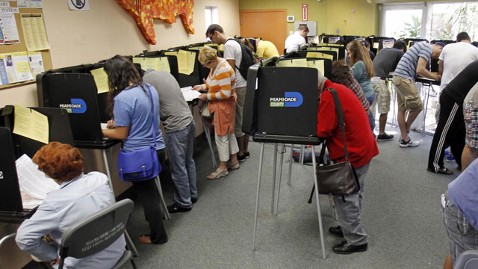By: Andrew Jarnagin
While Obama’s victory stole most of the highlights, here’s a rundown of everything else voters decided when they went to the polls.
Senate
The Democratic turnout bump provided by President Obama was invaluable in the nation’s Senate races. Democratic candidates won virtually all of the competitive races, and contingent on a recount in North Dakota that supports Heidi Heitkamp (D), Democrats will have upped their majority from 51 seats to 53. Add in the two Independents, who both lean left, and Harry Reid must be thrilled for the next session. Both Republicans that made controversial comments on rape were defeated: Todd Akin (Missouri) and Richard Mourdock (Indiana). Five women won Senate seats, which brings the count of female Senators to 19, a record number (20 if Heitkamp wins). Additionally, Tammy Baldwin (D) of Wisconsin was elected as the first openly gay Senator, and Mazie Hirono (D) of Hawaii is the first Asian-American woman in the Senate.
House of Representatives
Republicans kept control of the House, despite Democrats’ wishes to pick up the 25 seats needed to gain power. With several districts winners still undeclared, Republicans hold 232 seats to the Democrats’ 191, so the balance of power will likely remain similar to the last two years. Among Republican gains were 10 freshman House members aligned with the Tea Party movement. However, vice presidential candidate Paul Ryan did hold onto his Wisconsin seat.
Marijuana
Six states had ballot measures involving the drug: Arkansas, Massachusetts, Montana, Colorado, Washington, and Oregon. Both Washington and Colorado voted to legalize the recreational use of marijuana, becoming the first states to do so. Massachusetts enacted a medical marijuana program, while Arkansas rejected the same initiative. Oregon rejected a full-legalization measure, and Montana tightened its law on the drug’s use for medicinal purposes. These actions set the stage for a showdown between state legal departments and the DEA, which lists marijuana as a Schedule 1 substance. The DEA has stated that it does not intend to focus on individual users, but dispensaries may be subject to raids and prosecution by federal officials as has been the case in other states. Colorado governor warned users not to “break out the cheetos or goldfish” just yet, in light of impending legal battles.
Same-Sex Marriage
The citizens of four states – Minnesota, Maryland, Maine, and Washington – voted on gay marriage issues. Maryland, Maine, and Washington approved legalizing same-sex marriage, and Minnesota’s attempted ban failed. These votes reflect growing nationwide support for the issue and will likely represent yet another step towards federal legalization of same-sex marriage. Notably, these three states are the first to pass such a measure by popular vote. Look for the issue to stay in the news as the Defense of Marriage Act (DOMA), passed in 1996 and signed by Bill Clinton, comes under more legal challenges. The Obama administration has instructed the Department of Justice not to defend it in court, and it is likely to appear in Supreme Court cases in the next four years.
Justice System Reform
In California, the state with the second-largest prison population in the country, propositions to ban the death penalty and revise the notorious three-strikes law were hotly contested. The repeal of the death penalty, championed by liberals for its humanitarian value and by conservatives for the enormous budget savings it promises, was narrowly defeated. However, Proposition 36, which reduces the scope of mandatory three-strikes sentencing, passed by a significant margin. So-called “habitual offender” laws create mandatory 25 years to life in prison for persons convicted of three serious or violent felonies. Critics claim that mandatory sentencing takes power away from judges to examine each case individually, and overwhelmingly burdens the prison system with drug offenders that receive outlandish sentences. Criminals in California can breathe easier, but the death penalty still remains on the books.
Healthcare
And we thought the Supreme Court put an end to the bickering over the Affordable Care Act. Alabama, Montana, and Wyoming passed symbolic measures to invalidate portions of Obamacare, while voters in Florida rejected such a measure. The impact of these decisions remains to be seen, but they present, at the very least, a thorn in the side of the Obama administration as the ACA comes into effect in 2014. In other health and legal news, a doctor-assisted suicide measure was narrowly defeated in Massachusetts.
Georgia
Here in Georgia, the bitter fight over Amendment One, the charter school measure, drew to a close with proponents of school choice claiming victory. The amendment will create a state commission with the power to approve or reject charter school applications. Supporters say that the measure will provide more choice to parents and help boost Georgia’s poorly ranked school systems. Detractors note that local school boards already have the authority to create charter schools and the state Board of Education can overrule. They say the amendment will take power from local school systems and drain money from their budgets. Also, Georgia’s only remaining white Democratic Representative, John Barrow of Savannah, retained his seat against projections to the contrary as an outlier among a Georgia House delegation increasingly polarized along racial as well as party lines.

